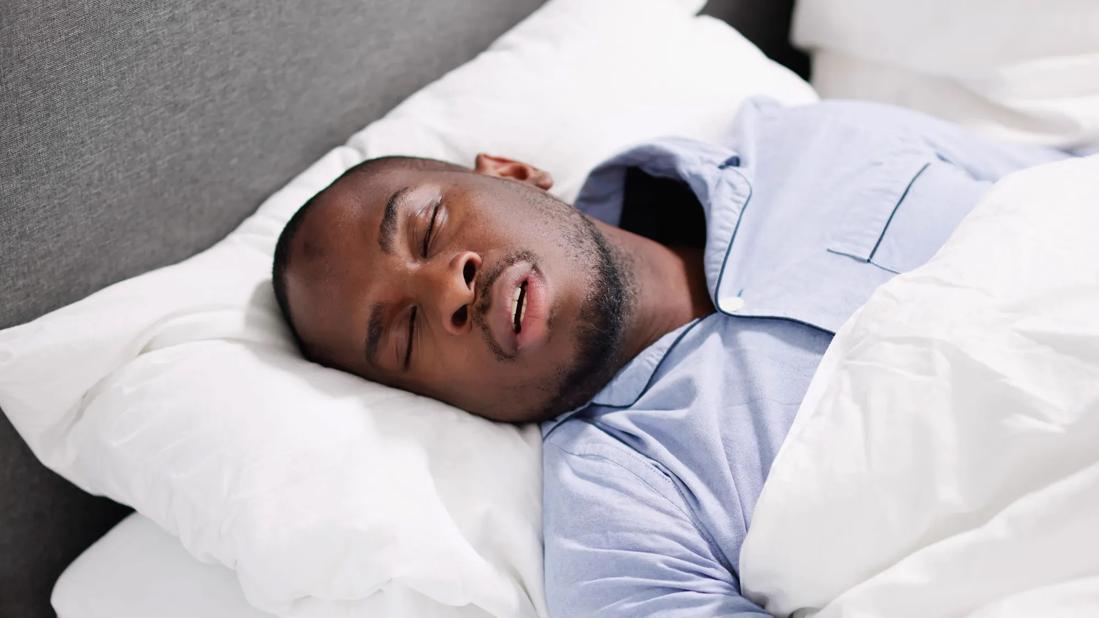Sleep apnea is associated with sudden cardiac death and other complications that increase your risk of mortality

Image content: This image is available to view online.
View image online (https://assets.clevelandclinic.org/transform/f79bd33f-00b1-429d-917d-a11ad44686c8/snoring-adult-bed-1493925857)
Man sleeping in bed with mouth open
Sleep apnea is a common condition that causes you to stop breathing while you’re asleep for 10 seconds or longer, five or more times per hour. If it goes untreated, you face several short- and long-term complications that can result in an increased risk of death from other cardiac and neurological conditions, including, in rare cases, sudden cardiac death.
Advertisement
Cleveland Clinic is a non-profit academic medical center. Advertising on our site helps support our mission. We do not endorse non-Cleveland Clinic products or services. Policy
Sleep medicine physician Catherine Heinzinger, DO, explains the mortality risks associated with sleep apnea, along with reasons why you should seek treatment whenever you receive a diagnosis.
Although rare, sleep apnea is associated with sudden cardiac death, which is when your heart suddenly stops beating. You have an even higher risk of death if you have a history of heart disease. Studies have shown that both obstructive sleep apnea and central sleep apnea are associated with heart failure, atrial fibrillation and stroke.
“Sleep apnea puts increased stress on your cardiovascular system,” explains Dr. Heinzinger. “When you stop breathing at night, your oxygen levels drop and that causes your heart to have to work harder to get oxygen to the organs and muscles that need it.”
And when your airway is closed, like with obstructive sleep apnea, the muscles that are working to take in a breath are putting direct pressure on your heart, increasing your risk for arrhythmias.
“A couple of studies have shown that people with untreated moderate to severe sleep apnea are three to six times more likely to die from any cause than those without sleep apnea,” she adds.
Obstructive sleep apnea is a mechanical problem that involves a blockage or narrowing of your airway. Central sleep apnea, on the other hand, occurs when there’s a disruption in communication between your central nervous system and your respiratory muscles. Although less common, central sleep apnea carries greater risks.
Advertisement
“In central sleep apnea, you have a pause in breathing because you’re not getting the cue to take a breath from your central nervous system, and that can be due to neurologic diseases or cardiac diseases that cause a delay in circulation,” explains Dr. Heinzinger. “Central sleep apnea is more closely associated with death and it’s also associated with a shorter time from diagnosis to death.”
The longer your sleep apnea goes untreated, the higher the risk you have for other conditions that can impact your quality of life and shorten your life expectancy. Such conditions include:
“Sleep apnea can increase your risk of obesity, but obesity can also increase your risk of sleep apnea,” notes Dr. Heinzinger. “When you have obesity, there’s more direct pressure on your airway coming from the soft tissues in your neck. And when there’s excess weight in your abdomen, it pushes up on the airway and makes it more likely to collapse.”
Treatments for sleep apnea involve:
Studies have shown that long-term treatment not only reduces mortality, but it also decreases the likelihood of other conditions, like cardiovascular disease and Type 2 diabetes. And treating both the sleep apnea itself, alongside its associated complications, can improve your cardiovascular risk and outcome.
Bottom line? If you’re having difficulty falling asleep, staying asleep or are struggling with daytime sleepiness, talk to a healthcare provider about seeing whether or not sleep apnea is getting in the way. The sooner you can diagnose the issue, the sooner you can start treatment and get on the road to better rest.
Advertisement

Sign up for our Health Essentials emails for expert guidance on nutrition, fitness, sleep, skin care and more.
Learn more about our editorial process.
Advertisement
Here’s what to know from a sleep medicine specialist
Manage your sleep apnea and keep your diabetes in check
Sleep masks can help you create total darkness so you can sleep better
To avoid sleep deprivation and shift work sleep disorder, try adopting habits that minimize light exposure and prioritize daytime sleep
Both are medical emergencies, but they are very distinct events with different causes
Sleep disorders, mental health conditions and other health concerns can all affect the quality of your sleep
Most people fall asleep within 10 to 20 minutes, but if your experience is different, adjusting your sleep schedule may help
Tart cherry juice contains natural compounds that may support better sleep
Although it could be used as a moisturizer, this new trend is not recommended
Communicating clear limits helps protect your time, energy and emotional well-being
High cholesterol can be genetic, but testing and treatment can lower your heart disease risk